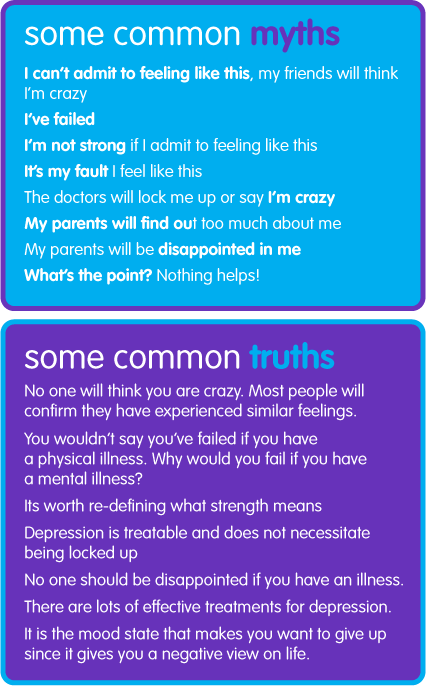There’s lots of misinformation about depression. These myths can cause a person who needs help to stay silent. When you start breaking down depression myths, you realize that depression isn’t something to hide or stay silent about. Do you know what is a depression fact or myth?
7 Depression Myths
- Depression doesn’t affect me. In the United States, 1 in 10 people suffer with depression. But over 80% of people who suffer with symptoms of depression don’t get treatment. So the chances of knowing someone suffering with depression is actually higher. That means someone you know suffers from depression. It may even be you. Depression affects men and women, young and old, rich and poor. No one is immune.
- You can ‘snap out of it’. No one chooses to get depressed. You can’t just ‘snap out of it’. It’s an illness much like cancer. You wouldn’t tell someone with cancer to just snap out of it or get over it. Depression isn’t about being lazy, weak, or stupid. It’s a health problem resulting from changes in the brain because of biological or situational factors. Depression needs to be treated in order for you to feel better. Even with treatment it can take years to start feeling better.
- Depression will go away on its own. A nice wish. Depression doesn’t go away on its own. Even the rare few who recover from depression needed help. Depression is about negative thoughts taking over your life and soul. Negative thoughts are powerful, and it takes effort and time to turn them around. Left untreated, depression will deepen and can cause suicidal thoughts. 60-80% of people who get treatment get better. But even then depression is never cured.
- Talking about depression makes it worse. Talking about depression won’t make you suicidal. That’s important for both you and your loved ones to know. Talk breaks stigma, brings negative thoughts out into the open, and reconnects you with the world. Supportive, non-judgemental talk is best. If you are hesitant to talk to family members or friends, there are support groups out there who want to hear from you. Even spiritual leaders can help you.
- Depression isn’t a real medical problem. Depression is a real and serious medical condition. It’s not any different than cancer, diabetes, or heart disease. It’s serious and can be deadly. Like all serious health problems, depression has physical symptoms. Depression can cause obesity, stroke, heart disease, and sleep disorders. Medication and cognitive therapy work best to treat depression. You can feel better if you get treatment.
- Depression only happens when something bad happens in your life. Depression doesn’t need a reason to start tormenting you. Depression can happen even when life seems to be going well. Depression can be genetic or caused by changes in the seasons (SAD). 1 in 10 women experiences depression in the weeks after having a baby. Some of the symptoms of depression are prolonged periods of hopelessness, sadness, and lack of interest in things you usually enjoy.
- Antidepressants change your personality. Antidepressants change certain chemicals in your brain. This might be scary but antidepressants are only supposed to affect certain brain chemicals to make you feel better, not change your personality. It’s true that antidepressants can make you sluggish but generally they increase your energy level from where depression has taken it down to. Antidepressants do have physical side effects so it’s important to talk to your doctor about how the medication may affect you.
You don’t need to feel overwhelmed by depression. If you are hopeless and considering hurting yourself, please call the National Suicide Lifeline 1-800-273-TALK
Twitter: @tereziafarkas #suicideprevention #depression
* Click here to find out more about Terezia Farkas and Depression Help Free.


